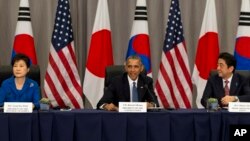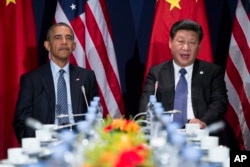U.S. President Barack Obama and the leaders of Japan and South Korea have urged the international community to “vigilantly enforce” tougher U.N. sanctions against North Korea, following Pyongyang’s nuclear and missile tests this year.
In separate talks with Chinese President Xi Jinping in Washington Thursday, Obama said both are "committed to the denuclearization of the Korean Peninsula and full implementation of U.N. sanctions.”
The leaders met on the sidelines of the Nuclear Security Summit being held Thursday and Friday.
Obama met first with South Korean President Park Guen-hye and Japanese Prime Minister Shinzo Abe. The longtime allies vowed they would stand together and tighten security cooperation in the face of rising tensions.
"One of the topics now most on our minds is the issue of North Korea and we are united in our efforts to deter and defend against North Korean provocations," Obama said with the three leaders seated side-by-side.
“We agreed during this meeting that trilateral security cooperation is essential in maintaining peace and stability in Northeast Asia, deterring the North Koreans' nuclear threat and the potential of nuclear proliferation as a consequence of North Korean activities,” he added.
North Korea has been roundly condemned for conducting a nuclear test in January and a long-range rocket launch in February, violating several U.N. Security Council Resolutions.
In March, the Security Council passed a resolution imposing tougher sanctions on Pyongyang. They require mandatory inspections of all North Korean cargo and ban the export of most of the country’s mineral trade that has been used to fund its nuclear development program.
About 90 percent of North Korean trade flows through or to China, so Beijing’s enforcement of the tighter sanctions is critical.
“What is essential going forward is to thoroughly enforce the resolution so that North Korea realizes it cannot ensure its own survivability unless it abandons its nuclear aspirations,” said Park.
The allies agreed to work together to “promote concrete security and defense cooperation between the foreign affairs and defense authorities of the three nations,” said Abe.
The U.S. has been encouraging China to press harder on North Korea to stop its nuclear provocations.
“I believe we can deepen our cooperation, including against nuclear smuggling,” said Obama just before meeting with Xi. “We're going to discuss how we're going to discourage nuclear missile tests that escalate tensions and violate international obligations."
Xi said China is seeking to “enhance communication and coordination on the Korea nuclear issue and other regional and global issues.” He called for mutual respect and dialogue in order to find solutions to “disputes and disagreements.”
Following the meeting, the U.S. and China issued a joint statement declared their commitment to work together on peace and stability "by reducing the threat of nuclear terrorism and striving for a more inclusive, coordinated, sustainable and robust global nuclear security architecture for the common benefit and security of all.”
Since North Korea’s aggressive actions this year, Washington and Seoul have started talks on the possible deployment of the U.S. Terminal High Altitude Area Defense (THAAD) missile defense system in South Korea, a move likely to raise tensions with Beijing.
“Insofar as we continue to face the threat from North Korean provocations from North Korea, we have to take necessary measures to protect ourselves and our allies,” said Ben Rhodes, deputy National Security Council adviser, who acknowledged Beijing has stepped up its pressure on Pyongyang.
“We've had good support from China, but we clearly believe that there's more that will continue to have to be done, including on enforcing the sanctions we've put into place,” he added.
Former U.S. Ambassador to China Winston Lord echoed that sentiment in an interview with VOA Mandarin Service, saying that without China's robust enforcement of sanctions, the measures will lack the impact required to get Pyonyang to the negotiating table.
"The biggest problem, very frankly, has been China. Even though it’s agreed to some sanctions [and] is certainly frustrated and angry with North Korea, it always gives North Korea a safety net," he said, explaining that while he wouldn't want civilians to suffer as a result of the economic impact, tougher measure are needed.
"If china had cut off energy, cut off other trades, you’d have a real chance of getting North Korea back to the negotiating table, but it will never do that," he added. "China believes it’s more important to have a communist buffer on their border, no matter how frustrated they are at Mr. Kim, than to have a unified Korea" allied with the U.S.
Obama and Xi discussed a range of issues, including climate change, cybersecurity, human trafficking and the thorny issue involving Beijing increasing expansive actions and territorial claims in the South China Sea.
Obama, Park and Abe also discussed a range of global challenges, including terrorism, climate change and cancer research.
This report was produced in collaboration with VOA's Mandarin Service.





